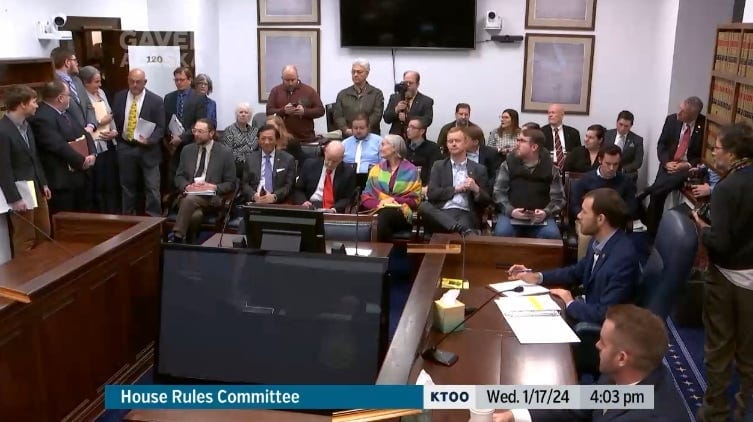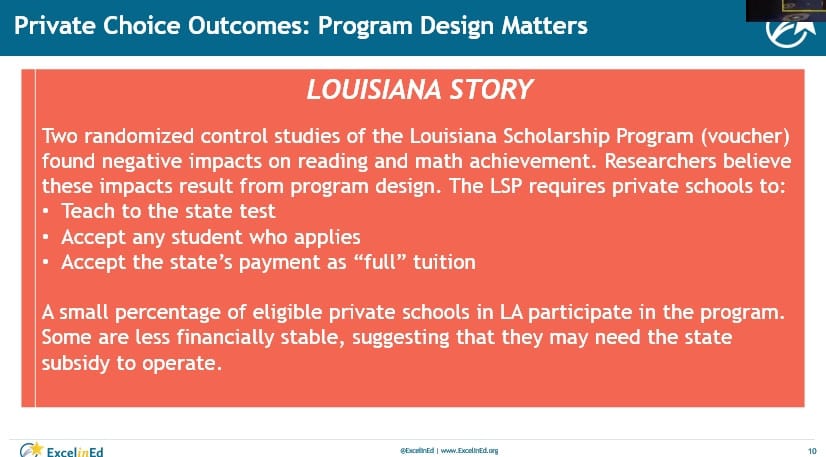AKLEG Week 1: ‘Let the games begin’
If it looks like a process aimed at limiting public input and clamping down on the possibility of any changes—like a bigger BSA—that’s because it probably is.

Happy Friday, Alaska.
In this edition: The 2024 legislative session is off to an eventful start, and education is at the center of it all. House Republicans—whose leadership put the kibosh on last year’s efforts to enact a permanent increase to school funding—are pushing forward with a much more limited increase that’s tied to a slew of Republican priorities. Let’s break down what’s in that bill and some of the concerns that are already springing up about both its contents and the process to rush it through.
Also, I’ve got the threads of the week, other legislative stories I’ve been tracking and the weekend watching.
Current mood: 🤔
‘Let the games begin’

After getting handily outfoxed by the Senate last session, House Republicans seem to be intent on getting the upper hand in this session’s fight over education funding and policy.
On the first day of session, House Republicans blocked an effort by the House Minority to call a joint session to consider the governor’s veto of education funding. House leadership argued that immediately restoring the $87 million in K-12 funding wasn’t a priority for them and that they were focused on a more sweeping package for education.
I’ll break down what’s in that new package later in this newsletter, but the key takeaway is that it contains considerably less funding for schools than what most advocates say is needed even to maintain the status quo under rising inflation, expiring one-time money and years of flat baseline funding. Oh, and it’s also loaded with a slew of Republican priorities.
On Thursday night, the House Majority reversed course on the veto override amid growing internal disagreements (which, if we’re dissecting last year’s power dynamic between the House and Senate, such divisions certainly played right into the Senate’s hands). Rather than air those conflicts in another split floor vote, House Speaker Cathy Tilton said a vote wasn’t needed after all and that the House would invite the Senate to a joint session. Apparently, someone got around to reading the Alaska Constitution’s provision that legislators “shall meet” to consider vetoes. Based on this apparently “new information,” Tilton said that “shall meet” does, in fact, mean that they shall meet.
The vote failed, as expected, given that Alaska has the highest bar for overturning budget vetoes at three-quarters of the entire legislature. The final vote was 33-26, with all House Republicans and a handful of Senate Republicans voting against the override.
Notably, there were several Republicans in both the House and Senate that changed course after supporting education last year. While they may argue that they’re simply focusing on permanent increases, this move cuts off the possibility that funding will be restored for the current budget year.
Others were even more cutting in their assessment of the Republicans’ change of heart on the issue. Anchorage Democratic Rep. Andy Josephson told the Anchorage Daily News he believed they put their allegiance with Dunleavy, who has a habit of blacklisting or retaliating against legislators deemed disloyal, over their local school districts.
“The only thing that makes sense is that they’re honoring his veto. And they don’t want to upset him, I guess. It’s the only thing that’s logical. There’s been no change in circumstances,” he told the paper. “The districts didn’t win the lottery. There’s been nothing that should otherwise change their position.”
How they voted:
In favor of the override: Reps. Armstrong, Carrick, Dibert, Edgmon, Fields, Foster, Galvin, Gray, Groh, Hannan, Himschoot, Josephson, McCormick, Mears, Mina, Ortiz, Schrage, Story and Stutes. Sens. Bishop, Claman, Dunbar, Giessel, Gray-Jackson, Kawasaki, Kiehl, Merrick, Olson, Stedman, Stevens, Tobin and Wielechowski.
Against the override: Reps. Allard, Baker, Carpenter, Coulombe, Cronk, Eastman, C. Johnson, D. Johnson, McCabe, McKay, Prax, Rauscher, Ruffridge, Saddler, Shaw, Stapp, Sumner, Tilton, Tomaszewski, Vance and Wright. Sens. Bjorkman, Hughes, Kaufman, Myers and Wilson.
Absent: Sen. Shower
About the bill
The day before the override vote, the House Rules Committee pulled back the curtains on its omnibus bill, returning to the classic Republican approach to education: Tying a smaller-than-needed increase in education funding to a litany of right-wing policies.
Here are the broad strokes of the changes:
A $300 increase to the base student allocation, the figure that’s used to determine funding for each school district based on factors like size, location, the number of students and the needs of those students. It amounts to about $77 million annually, which marks a cut in funding from the current year—even when factoring in the governor’s veto.
It alters the BSA formula by increasing how much each district receives for (and mostly passes through to) homeschool students, amounting to a $23 million increase for homeschooling.
It rolls in Gov. Dunleavy’s proposed teacher bonus legislation, which didn’t get much attention in the last session but has become his key ask for K-12 education this year. It proposes paying teachers between $5,000 and $15,000 at the end of the school year, depending on where they’re teaching, but has no requirements that they keep teaching. The program, which Dunleavy has pitched as a way to test union claims that pay really matters, would cost about $58 million every year for three years. The proposal has raised concerns that it could violate the Alaska Constitution’s equal protection clause and labor agreements (which, if we’re being fair, has never stopped Dunleavy before).
A change in law putting the power to create new charter schools in the hands of the state Board of Education. This policy originated from the House Ways and Means Committee under far-right Rep. Ben Carpenter, R-Nikiski, and hasn’t been heard in any education policy committee.
A permanent extension of the education tax credit program.
Includes legislation establishing what sponsor Rep. Jamie Allard, R-Eagle River, has called a bill of rights for deaf and hard-of-hearing students. It would require districts to better accommodate deaf students (without additional funding) and require the state to establish a residential school for deaf and hard-of-hearing students.
Each of these new proposals is pulled from existing Republican-sponsored bills that have had mixed levels of review through the committee process. None have passed either chamber of the legislature. In practice, it allows the House Republicans to box in the discussion on education funding and policy as the legislation heads back to the Senate for a conference committee.
The strategy isn’t missed by legislators.
“Normally, as substantive policy bills move through the legislative process they are seen by multiple eyes and examined from multiple perspectives,” wrote Sen. Löki Tobin, the Anchorage Democrat who chairs the Senate Education Committee in her newsletter outlining the new bill. “That way issues, blind spots, and concerns rise to the surface and are properly examined. Legislative scrutiny and robust public input are critical in developing good public policy.”
House leadership has outlined a breakneck pace for the legislation moving forward. After rolling out the legislation on Wednesday afternoon, they’ve already scheduled the only public hearing on the bill for this Saturday, starting at 10 a.m. They plan to consider any amendments to the bill at the same hearing (the deadline to submit them is today) and send the bill to the House floor for a vote as early as next week.
It should be noted that it’s unusual for a bill to get this level of attention in the House Rules Committee, which typically deals with scheduling bills and not complex policy issues that haven’t been thoroughly vetted by other committees. It’s even more unusual for a Rules Committee to be hearing public testimony.
If it looks like a process aimed at limiting public input and clamping down on the possibility of any changes—like a bigger BSA—that’s because it probably is.
“Let the games begin,” House Rules Committee Rep. Craig Johnson said at the end of the hearing.
Charter schools

Let’s take a moment to break down the charter school provisions, which may be one of the most significant policy changes contained in this bill.
The House Education Committee had a fascinating hearing on charter schools in the last session as part of a discussion about school choice (that I wrote about here). While it was designed to promote charter schools and other alternatives to traditional neighborhood schools, there were a few key takeaways that should cast some doubt on them being a panacea for the state’s entire education system.
Namely, the success of charter schools largely depends on how selective they can be with their students (as well as how well they are regulated).
Whether it’s tuition in other states or requirements from parents to provide things like transportation, meals, or volunteer hours, the result is that charter students typically come from wealthier families. Part of that presentation found that when charter schools are required to accept all students regardless of means, they look and perform much more like regular neighborhood schools.
This is a point that Rep. Zack Fields, D-Anchorage, pointed out in the House Rules Committee hearing while objecting to the new version of the bill. He recognized that Alaska’s charter schools have students who do better on standardized test scores, but he said that should be expected.
“There’s a reason why if you only test high-income kids whose parents have almost unlimited opportunities to invest in their enrichment, yeah, they’re going to score well,” he said. “That doesn’t necessarily mean those charter schools are doing better than neighborhood schools. … I’m happy to support charters; I don’t want to support charters at the expense of our neighborhood schools.”
Others have pointed out the irony of the governor using the success of Alaska’s charter school system as a reason to alter it drastically. The new law would take almost all of the decision-making in creating, operating, and overseeing charter schools away from locally elected school boards and put it into the hands of the state Board of Education—which is appointed by the governor and has been instrumental in implementing far-right policies on schools.
In the hearing, Fields said the changes amount to a de facto implementation of school vouchers in Alaska, undermining the Alaska Constitution’s prohibition on public education dollars going to private and religious programs.
“As constructed, the charter language is effectively a voucher program in which we would have so-called charter schools with nearly no public oversight using public funds for potentially religious material,” he said.
To be clear, Dunleavy has long been opposed to that part of the Alaska Constitution, and it was one of the few legislative priorities he took up as a senator (the other big one being messing with sex ed). Attorney General Treg Taylor has also been heavily involved in this front and ultimately had to recuse himself from legal questions over whether homeschool families could use the funds on private and religious instruction.
Why it matters: As I wrote in the original post about charter schools, there’s nothing inherently wrong with private schools, public charter schools or homeschools, but it is wrong for public funds to be diverted away from neighborhood schools that serve everyone to programs that benefit only some. Legislators ought to address the system's inequities rather than make them deeper.
Stay tuned.
The Alaska Memo by Matt Buxton is a reader-supported publication. To receive new posts and support my work, consider becoming a free or paid subscriber.
Follow the threads
The Senate gavels in, and the Senate Majority holds its news conference
The House gavels in and has a fight over the education override
The House Majority’s news conference
The House Minority’s news conference
The Senate Finance Committee’s hearing on the production forecast
The House Rules Committee rolls out its education omnibus
A quick joint session on the education veto
Stories I’ve been covering for The Alaska Current
Hundreds rally for Alaska education funding ahead of legislative session
SCOTUS rejects Alaska Gov. Dunleavy’s appeal in union dues case
Alaska Legislature unlikely to take up K-12 veto after House GOP blocks vote
Rep. Vance, Alaska House Republicans take aim at voter-approved dark money law
Alaska House GOP to hold single public hearing on sweeping education bill
Alaska legislators fail to override Dunleavy’s K-12 funding veto
Weekend watching
It’s an education-heavy week, so why not also look at the story behind the SAT question everyone got wrong.
Have a nice weekend, y’all and go Lions!
The Alaska Memo by Matt Buxton is a reader-supported publication. To receive new posts and support my work, consider becoming a free or paid subscriber.
The Alaska Memo Newsletter
Join the newsletter to receive the latest updates in your inbox.




